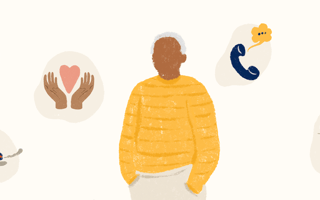
The United States has greater healthcare disparities than most other wealthy countries in the world.
According to a recent study published in Health Affairs, adults with lower incomes in the U.S. are “far more likely” to go without needed care because of high costs, and struggle to afford basic necessities like safe housing and healthy food. These folks are also more likely to have multiple chronic conditions than the 10 other high-income countries analyzed. All told, on every measure of health status, affordability and accessibility, the U.S. reported some of the largest income disparities.
These inequalities have dire implications every day, but they’ve certainly been more vividly on display amid the pandemic. Over the past nine months, people with lower incomes have consistently been more likely to contract the novel coronavirus and, ultimately, die from COVID-19.
“The pandemic is making it abundantly clear that we need to address the deep health inequalities in this country,” said Andy Slavitt, a board member for Cityblock Health, an NYC startup that aims to improve healthcare for low-income patients. “We need a Cityblock in every community that we have ignored for too long and where the odds stack against people to live a healthy life.”
Now, with $160 million of fresh funding in its coffers, the company is one step closer to doing just that. The Series C was led by General Catalyst, and brings Cityblock’s total valuation to more than $1 billion.
Launched in 2017 out of Alphabet’s Sidewalk Labs, Cityblock is focused on providing individuals from marginalized communities with the primary care, behavioral health and social services they need both virtually and in-person.
The company does this by working with insurers to identify patients with complex medical needs, people who tend to be costly to the traditional healthcare system and are usually poorly served by it. These folks also often have mental-health conditions, substance abuse disorders and a lack of access to adequate housing or transportation, which also takes a toll on their health.
Right now, Cityblock provides care to 70,000 members in New York, Connecticut, Washington, D.C., and Massachusetts. Bloomberg reported that nearly 80 percent of its members have at least three chronic conditions, and two thirds are people of color.
The company uses a value-based care model, collecting fixed annual payments rather than charging fees for each service it provides. This approach is intended to keep patients healthy and out of the hospital, which in turn saves money in the long run.
“We cannot turn a blind eye to a healthcare system that cycles vulnerable communities through frequent ER visits and hospital stays,” Cityblock co-founder and CEO Iyah Romm said in a statement. “We believe that new models of care delivery, rooted in preventative care and augmented with social services, are one major path forward in righting the injustices of our healthcare system.”
Indeed, Cityblock says that, over the last year, its members have had to go to hospital less often. Plus, both its membership and revenue have more than doubled. Now, it plans to keep up the momentum by using this funding to fuel its national expansion and launch new services. The company is also hiring, with open roles in its product, engineering, data science and business operations departments.



